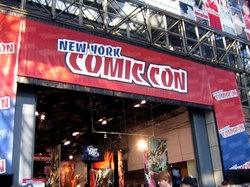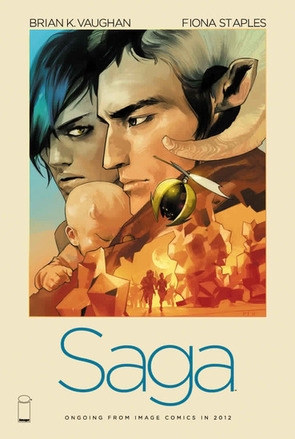Comics /
Comics News
Creator Migrations announced in New York
By Zak Edwards
October 20, 2011 - 15:38
 |
The New York Comic-Con took place last weekend and, amongst the hoopla over Joss Whedon’s latest project, some thing called the Avengerators or something, there were lots of announcements, panel discussions, SWAG, and people nervously holding up lines at creators by trying to discuss the most inane details of comic books. But the second thing is what I am interested in. Next January, comic writer Ed Brubaker and long-time and frequent collaborator Sean Phillips are launching their latest endeavour, a book called Fatale. This, for those of you who have been following their comics Criminal and Incognito, comes as no surprise as the announcement of something new came in their latest issue of Criminal, now it has a name and some artwork. What interest me, however, is who is publishing Brubaker and Phillips’ Fatale. The answer is not Icon, the long-time Marvel Comics sister publisher of Criminal and Incognito, but Image. And this got me thinking about San Diego’s most exciting announcement: Brian K. Vaughan’s glorious return to comics with a book not published by DC, like Y: The Last Man (under Vertigo) or Ex Machina (the now defunct Wildstorm), but once again Image Comics.
So my question here is why. Why are big name, best-selling creators with plenty of followers leaving their long-established and fruitful relationships with DC and Marvel Comics and going to Image Comics? And, more importantly, what does this mean for the Big Two and their approach to creator-owned work?
 |
Icon Comics was created for a single reason: Marvel wanted Brian Michael Bendis and Bendis was unwilling to sign an exclusive contract without making sure he still owned Powers, a comic series he was publishing with Image at the time. Since then, Icon has taken extremely safe risks, publishing creator-owned work by their most popular artists and writers; people like Mark Millar (Kick-Ass, Superior, etc.), Matt Fraction (Casanova), David Mack (Kabuki), and the aforementioned Ed Brubaker. The publishing house is basically designed to keep A-List stars happy producing comics under the Marvel house and, judging by their strict no overprinting policy, they aren’t taking many monetary risks and certainly not fostering any new voices. But the question still remains, why are Brubaker and Phillips leaving Icon?
Vertigo Comics, however, is the one I am much, much more curious about. Founded in 1993 by editorial mega-force Karen Berger, Vertigo Comics is responsible for some of the most celebrated and important comic book series this side of the pond. Neil Gaiman’s Sandman, Warren Ellis’ Transmetropolitan, Garth Ennis’ Preacher, Grant Morrison’s The Invisibles, and a whole slew of other books, have all been published by Vertigo Comics. Vertigo was also willing to take risks with creators, just look at Grant Morrison’s work with them for immediate examples. These books helped change the medium, how books are written and read, and, most importantly, did this on a relatively large scale, reaching more non-comic readers than practically anyone not born in Belgium. But recently, Vertigo has quieted down considerably. At the past two San Diego Comic-Cons, they haven’t announced anything except reprints. Scalped, DMZ, and Northlanders are all ending fairly soon, the rights of originally DC properties, like John Constantine, Animal Man and Madame Xanadu, have reverted back to the publisher, taking certain properties away from Vertigo (Hellblazer continues to be published, but Constantine, Animal Man, and Xanadu are all involved in the DC relaunch). And the new books they have been taking on over the past few years, haven’t been particularly risky, although the publisher is still putting out some extremely strong titles. Books like The Filth, Sea Guy, and Young Liars simply don’t exist anymore, replaced by a series of crime graphic novels, and many of the series’ now finished have been replaced by books that are, genre-wise, very similar. Once again, I am not commenting on the quality of these works, only the lack of experimentation this publisher used to be known for.
 |
But here’s the kicker: Vertigo Comics did some major ‘restructuring’ in how they pay their creators last year. According to Rich Johnston over at Bleedingcool.com, Vertigo changed how creators are payed in respects to their monthly single issues and trade paperback collections. According to Johnston, the deal works as follows:
“If (the) book doesn’t make enough money as a monthly, they’ll won’t pay trade paperback royalties until it’s made enough money for the publisher... The trade paperback clawback will kick in if monthly sales don’t reach 50,000 – which Vertigo books haven’t really seen since the Sandman days. It’s also possible that sales of trade paperbacks will never make enough to pay our royalties. And there are some current creators who depend on those royalties.”
Does the way Vertigo treats their creators affecting the decisions of the current big names movement towards Image Comics? I would hazard a guess at probably. Big time creators might be looking to Image Comics, who frequently tops the trade paperback charts (they only had two in the top ten of September 2011, but wait until November when The Walking Dead TV show shakes that up) and thinking about what will get them both widely read in multiple mediums and the most money. Seeing as neither Vertigo or Image broke the Top 100 Comics last month (and only The Walking Dead broke into it in August), it seems it’s as good a shot as any into why powerhouses like Brubaker and Vaughan are leaving for other pastures.
There are three major questions these situations leave in my mind: 1. Are DC and Marvel Comics getting out of the creator-owned comics business? 2. Is Vertigo winding down and closing like Wildstorm? 3. What does this mean for creator-owned series? Yes, many regular book publishers are getting into graphic novels, Pantheon has been doing it for years, but how it seems the avenues for creators who want to publish ongoing comic book series with serialized trades are getting narrower. How this affects the products coming out, only time will tell, but it is an important subject to consider.
Last Updated: March 3, 2025 - 20:40


